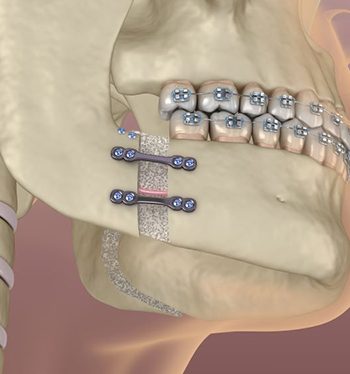Corrective Jaw Surgery – Jupiter, FL
A Healthier Jaw
Leads to a Healthier You

When your upper and lower jaws do not work harmoniously together, you may experience a range of symptoms, such as difficulties with speaking and eating. You may also notice symptoms of TMJ disorder and obstructive sleep apnea. Here at South Florida Oral & Maxillofacial surgery, our teams in Jupiter and nearby communities want to help you enjoy a healthier jaw. In some cases, we perform corrective jaw surgery, also known as orthognathic surgery, to accomplish that.
Why Choose South Florida Oral & Maxillofacial Surgery for Corrective Jaw Surgery?
- Experienced, Skilled, & Empathetic Team
- Sedation Creates a Comfortable Experience
- Enjoy Long-Term Improvements in Jaw Function
What Is Corrective Jaw Surgery?

Also known as orthognathic surgery, corrective jaw surgery can describe one of several procedures the goal of which is to correct deficiencies and abnormalities in the jaw’s form and function. Often, braces or other forms of orthodontic treatment work along with corrective jaw surgery to achieve optimum results.
How Does Corrective Jaw Surgery Work?

To get the ball rolling on your treatment, you should attend a consultation with our team. We will examine your teeth, take some images of your jawbone, and ask you some questions about your symptoms. From there, we will be able to start planning the details of your surgery. We may refer you to an orthodontist so your teeth can be repositioned before you move forward with your procedure.
On the day of your surgery, you can expect to have a comfortable experience because you will be sedated. The surgery can take anywhere from 2 – 8 hours, depending on whether we are working on one of your jaws or both (and other factors). You may need to stay in the hospital for a day or two during the initial part of your recovery.
Corrective Jaw Surgery Aftercare

We will send you home from the hospital with detailed aftercare instructions. Most people need to stay home from work and get plenty of rest for at least 1 – 2 weeks. You should also plan on consuming a modified diet, which will consist of liquids and other foods that require little to no chewing. Our team will make sure you have directions on how to care for your oral hygiene during your recovery. Swelling should reach its peak 2 or 3 days following your surgery, after which it should gradually start to subside over the course of 1 – 2 weeks.
It can take several months to a year for your jaw to completely heal. Throughout most of that time, though, you should feel relatively normal.
If you encounter any questions or concerns while you are healing, you should reach out to us immediately. We are always ready to help our patients!

